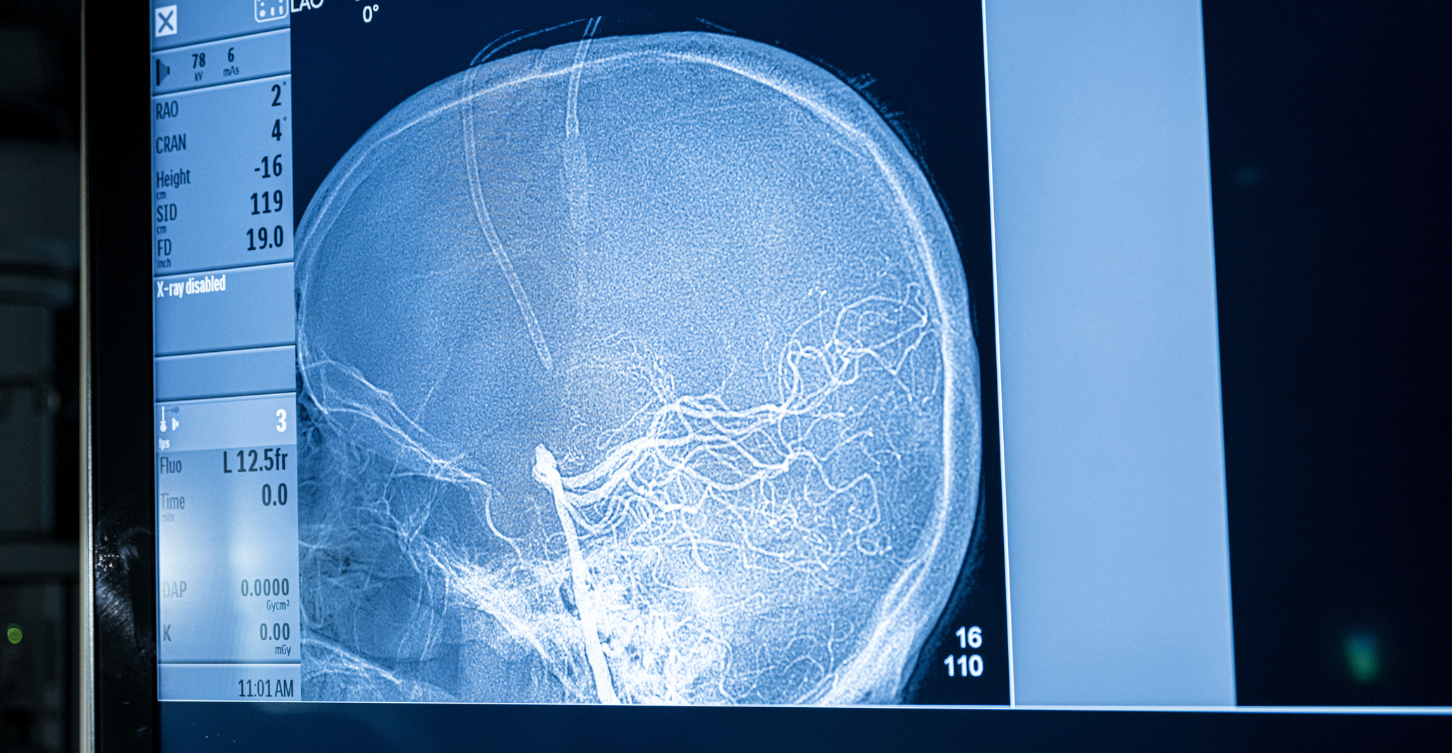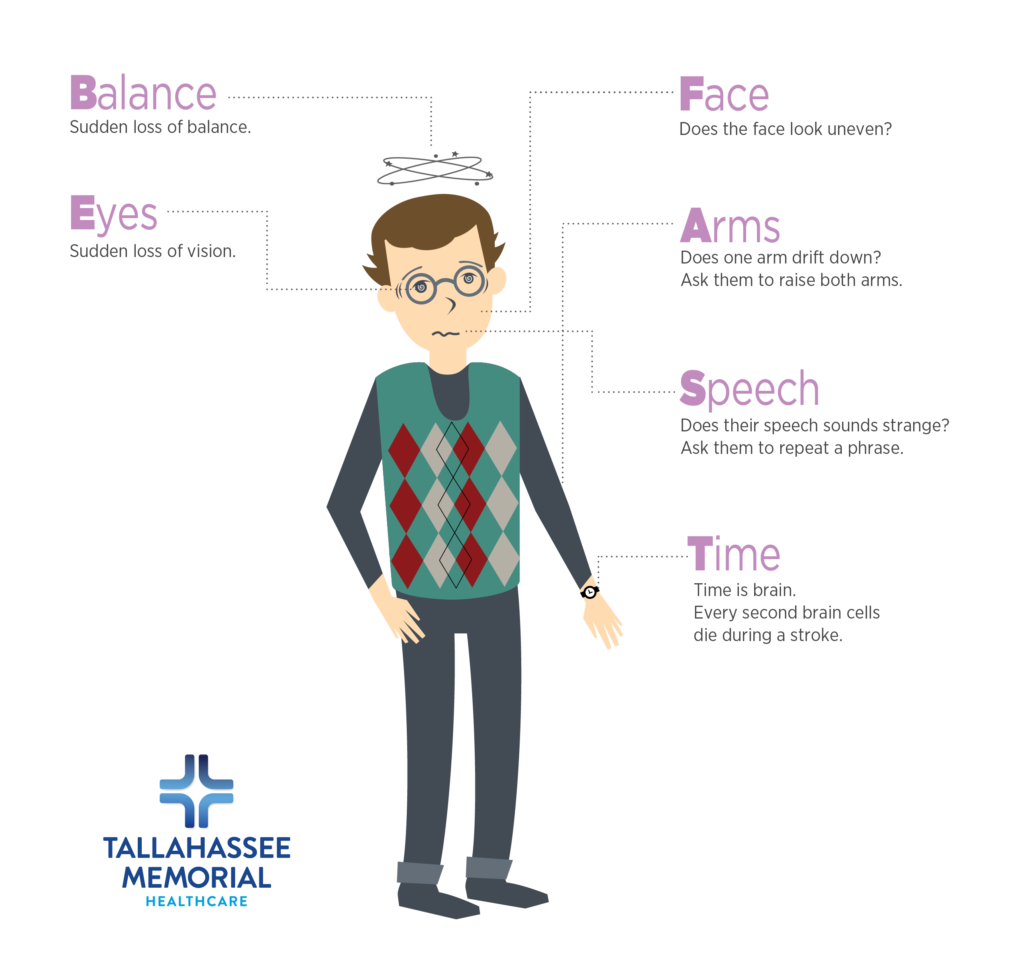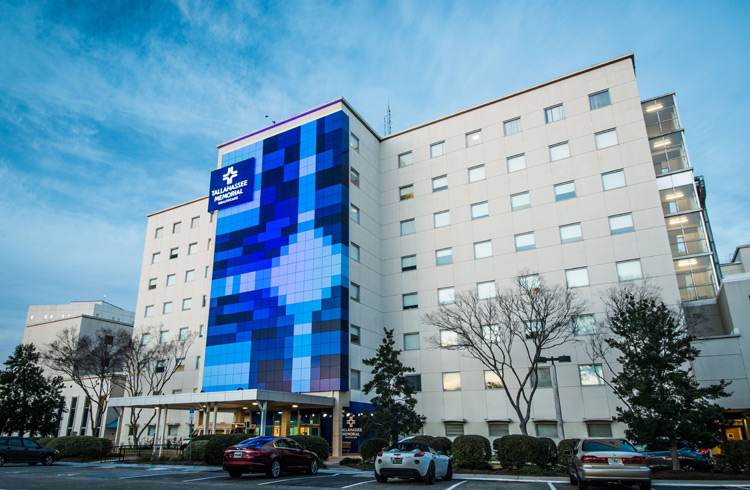Lifestyle Changes to Prevent Stroke
May 14, 2024
According to the American Stroke Association, stroke is the number-five cause of death and a leading cause of adult disability in the United States. On average, someone in the U.S. dies of a stroke every 3 minutes and 14 seconds, and 795,000 people suffer a new or recurrent stroke each year.
May is National Stroke Awareness Month – a time to share information about what stroke is and lifestyle changes everyone can make to prevent it.
What is a Stroke?
A stroke is a very serious medical emergency that occurs when blood flow is cut off to an area of the brain – a literal “brain attack.” Without blood flow, brain cells are deprived of oxygen and begin to die, leading to further complications if not treated quickly. An ischemic stroke is caused when a blood vessel is suddenly blocked, much like a heart attack. A hemorrhagic stroke occurs because of sudden bleeding in the brain, such as a ruptured aneurysm.
As a Primary Stroke Center, Tallahassee Memorial HealthCare (TMH) offers a variety of revolutionary treatments for strokes, including tPA, a clot-busting intravenous medication, and endovascular neurosurgery, which removes blood clots and repairs aneurysms without opening the skull.
Reducing Your Stroke Risk
A stroke can happen to anyone at any time. While there are some risk factors that are out of your control – gender, genetics, race and age – other factors can be monitored to reduce your chances of having a stroke.
1. High Blood Pressure
Blood pressure health is important to your heart and brain health. High blood pressure can lead to damaged blood vessels, causing them to narrow, break or leak. High blood pressure can also lead to blood clots forming in the arteries that can travel to your brain, causing a stroke.
Routine visits to your primary care physician can help you monitor your blood pressure and treat it if it is too high. Optimal blood pressure is less than 120/80 mmHg.
2. Smoking
Smoking can lead to various health problems, including stroke.
Some health consequences of smoking include:
- Increases the fat in your blood
- Lowers ‘good’ cholesterol
- Makes blood more likely to clot
- Damages cells that line the blood vessels
- Increases the buildup of plaque in blood vessels
- Thickens and narrows blood vessels
Tobacco Free Florida offers free tools and resources available for all Floridians to start their quitting journey.
3. Obesity and Diabetes
Obesity is considered both a primary and secondary risk factor for stroke. Obesity can lead to difficulty in blood flow and an increased risk of blockage due to inflammation and excess fatty tissue. Obesity can also lead to high blood pressure, diabetes and high cholesterol, which are all risk factors for stroke.
Untreated diabetes can lead to an excess of glucose in the bloodstream, which can lead to increased fatty deposits or clots in blood vessels that can cut off supply to the brain. It’s important to routinely visit your doctor if you suffer from diabetes to reduce your risk of stroke and other complications.
TMH Physician Partners - Endocrinology, Obesity & Diabetes offers individualized, team-based care for individuals with chronic conditions, including diabetes. The team is made up of medical specialists, registered dietitians, diabetes educators and behaviorists. For help getting diabetes under control, schedule an appointment with our team.
4. High Cholesterol
High cholesterol causes the development of fatty deposits in your blood vessels. When these deposits grow, it can be difficult for enough blood to flow through your arteries, and the deposits can break and form blood clots, causing a heart attack or stroke. A total cholesterol of less than 200 mg/dL is considered normal. Speak to your primary care provider about completing blood work to learn about your cholesterol levels.
5. Carotid or Other Artery Disease
Carotid artery disease is a blockage or narrowing of the carotid arteries, major blood vessels that provide your brain’s blood supply. This disease causes up to one-third of all strokes so treatment for this or other artery disease is important to reduce your risk. At TMH, we offer a wide range of approaches to diagnosing and treating the full spectrum of vascular conditions through our team of interventional cardiologists and vascular surgeons.
6. Atrial Fibrillation (AFib)
Atrial fibrillation (AFib) - a type of heart arrythmia where blood does not properly flow between the chambers of the heart – causes about one in seven strokes. This can cause blood to pool in certain areas and create blood clots, which may travel to the brain, leading to a stroke.
The good news is that AFib is treatable in most cases. Our expert Heart Rhythm Clinic team offer the most advanced and minimally invasive options available.
7. Excessive Alcohol Intake
Evidence shows that excessive alcohol intake can lead to blood coagulation, or when your blood thickens and turns into a semi-solid. Alcohol is also linked to certain heart problems that contribute to stroke.
8. Sleep Apnea
Sleep apnea is a chronic condition causing an individual to partially or completely stop breathing throughout the night. This can lead to low oxygen levels during sleep and elevated blood pressure, which can lead to increased risk of stroke.
Symptoms of sleep apnea include snoring, disrupted sleep, fatigue during the day, headache and problems with concentration or memory. Treating sleep apnea significantly decreases your risk for adverse health issues. If you think you could have sleep apnea, it’s important to seek medical care. TMH Physician Partners - Pulmonary, Critical Care & Sleep is home to a team of board-certified sleep medicine physicians and will work to identify your symptoms to get to the root of your problem.
Recognize and Respond to Stroke
Every second, brain cells die during a stroke. Recognizing the symptoms of a stroke can save precious time for your brain that is needed to treat a stroke.

Remember to BE FAST, call 9-1-1 as soon as your notice symptoms.
TMH is proud to offer the most advanced care in the region to stroke patients, but stroke treatment also depends on you acting quickly to seek care. Through rapid diagnosis, innovative care, rehabilitation and support, many of our patients are able to return to their lives after experiencing a stroke.
For more information about TMH’s stroke services, visit TMH.ORG/Stroke.

